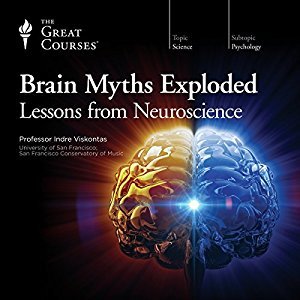What do you think?
Rate this book


Audiobook
First published February 3, 2017
Some foods, for example, can trigger the release of certain hormones that can then affect brain function. One of these hormones is called brain-derived neurotrophic factor (BDNF), which has a number of jobs, one of which is to guide and promote the growth of new neurons and the connections between them.The following is a link to an Atlantic article titled "Fish Oil Is Good! No, Bad! No, Good! No, Wait."
It’s very active in the hippocampus, which is where our short- term memories are turned into long-term ones. The hippocampus is our window both to the past and to the future; we need it to travel backward in time in our memory and forward in time in our imagination.
Because it plays a big role in shaping the hippocampus, BDNF is important for long-term memory formation. If you put an animal— human or otherwise—in an enriching environment, for example, more BDNF will be produced in his brain, leading to more synapses, more dendrites, and more neurons, the ultimate effect of which is that the animal learns more. It gets smarter than an animal raised in an impoverished environment, whose brain has lower levels of BDNF and fewer of these changes.
The key ingredient in fish oil is omega-3 polyunsaturated acid— specifically, docosahexaenoic acid (DHA)—and you might have heard claims that it’s good for your brain. You can find it in oily fish, such as salmon, mackerel, and sardines, or you can take it as a supplement. DHA is thought to play a role in brain development by increasing the expression of BDNF.
From work with rodents, we know that omega-3 fatty acids turn on genes that help keep the signaling system between brain cells working properly and enable neuroplasticity, or the types of physical changes that drive learning.
DHA is the most prevalent fatty acid in brain cell membranes—the protective covering that keeps the good stuff in the cell and the bad stuff out—but that also plays a major role in signaling between cells.
There’s some evidence that our ability to add DHA to our diets was a turning point in our evolutionary history, helping our brains grow in size compared with the rest of our body—increasing the brain-to-body-mass ratio, or encephalization quotient. DHA is also an antioxidant.
DHA supplements are recommended by the American Heart Association because they seem to reduce the risk of coronary artery disease. And cardiovascular problems contribute to cognitive decline. Eating a lot of fish also seems to be associated with a lower risk of stroke.
They also reduce inflammation, which has been associated with neurodegenerative diseases such as Alzheimer’s. And omega-3 fatty acids might even play a direct role in decreasing Alzheimer’s pathology because they reduce amyloid production and the plaques that are a signature of the disease are made up of amyloid.
Fish oil likely won’t make a difference unless you’re pregnant, under the age of 1, or at risk of showing cognitive impairment, either in childhood or in old age. There doesn’t seem to be any evidence of DHA to make you smarter.